Drupal vs. WordPress: Key Strengths of the Top CMSs
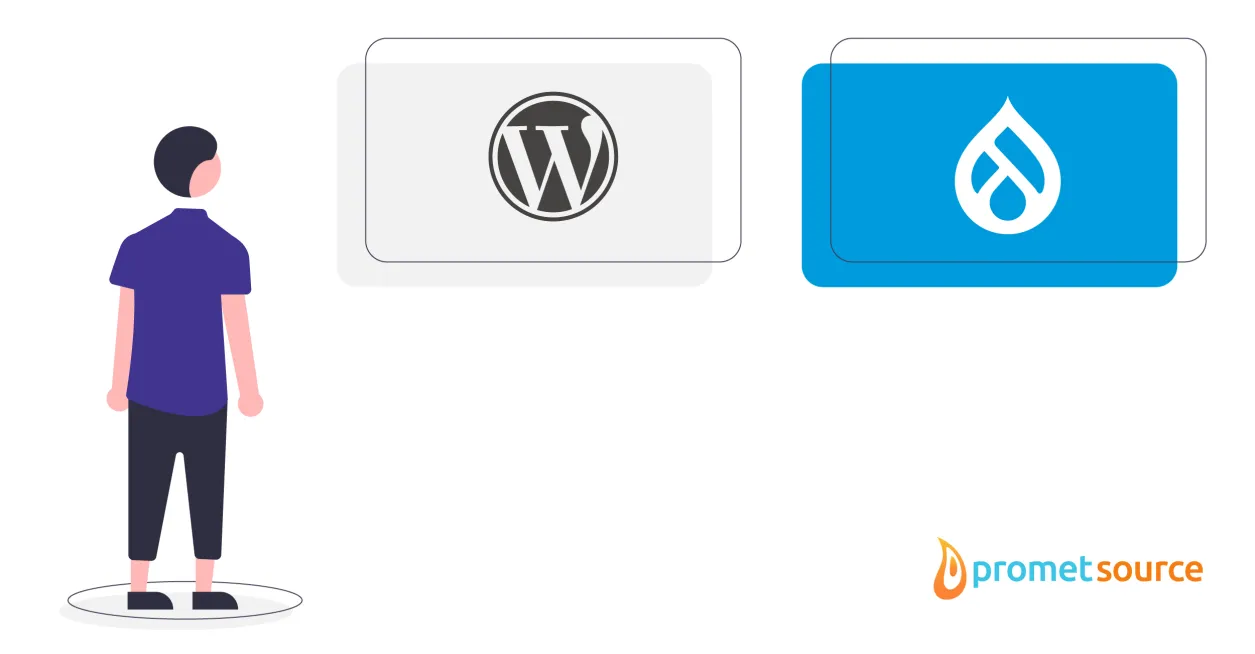
A frequent question in the open-source CMS world is a variation of: “Which is better, Drupal or WordPress?”
There’s not a simple answer to the WordPress vs Drupal question. Many have a strong bias towards one CMS or the other, but often, staunch opinions on the subject are based on a few cursory facts or outdated information.
Both WordPress and Drupal have evolved a lot since their introductions in the early 2000s. In some ways, this evolution has brought them into closer alignment with each other, evidenced by developments such as the porting of WordPress’s Gutenberg content editor over to Drupal in 2018.
Drupal’s addition of Layout Builder into Core has served as a significant step forward for easily building landing pages using prebuilt components – a feature that’s leveraged by Promet’s Provus® platform.
In other ways, WordPress and Drupal evolutions have clarified distinctions. Generally speaking, though, the majority of sites can be supported equally well by either option.
Which CMS is More Scalable? More Secure? More User Friendly?
That’s not to say that the WordPress vs Drupal debate doesn’t still spark strong opinions, as both have their devotees.
Promet Source has deep ties to Drupal, and over the past few years, we have broadened our perspectives and talent base to include WordPress advocates and experts. As such, we're well positioned to objectively cover an in-the-trenches comparison of the strengths of each.
Let's start with a few key stats and facts about Drupal and WordPress.
What are the Benefits of Drupal?
A modular CMS written in PHP, Drupal enables developers to leverage a flexible taxonomy system that’s designed to organize complex content types, set highly customizable user permission levels, and ensure web accessibility compliance with enhanced testing and tracking capabilities.
The November 2015 release of Drupal 8 set in motion Drupal’s enterprise-level trajectory. Drupal 8 amounted to a complete architectural overhaul from Drupal 7. Upgrades from Drupal 8 onward are now intended to be incremental, bearing no resemblance to the migration that accompanied the leap from Drupal 7 to Drupal 8.
The trend toward steady, incremental upgrades is particularly true with the December 2022 release of Drupal 10.
Upgrades between Drupal 8, 9, and 10 have continued to solidify and enhance core features, as well as accessibility. Through ongoing revisions and community efforts, Drupal is on a consistently feature-rich trajectory.
An important example is the availability of no-code/low-code solutions, such as drag-and-drop functionality or component-based design capabilities that are finding their way into Drupal – empowering marketers and content editors with greater possibilities and flexibility for managing their sites.
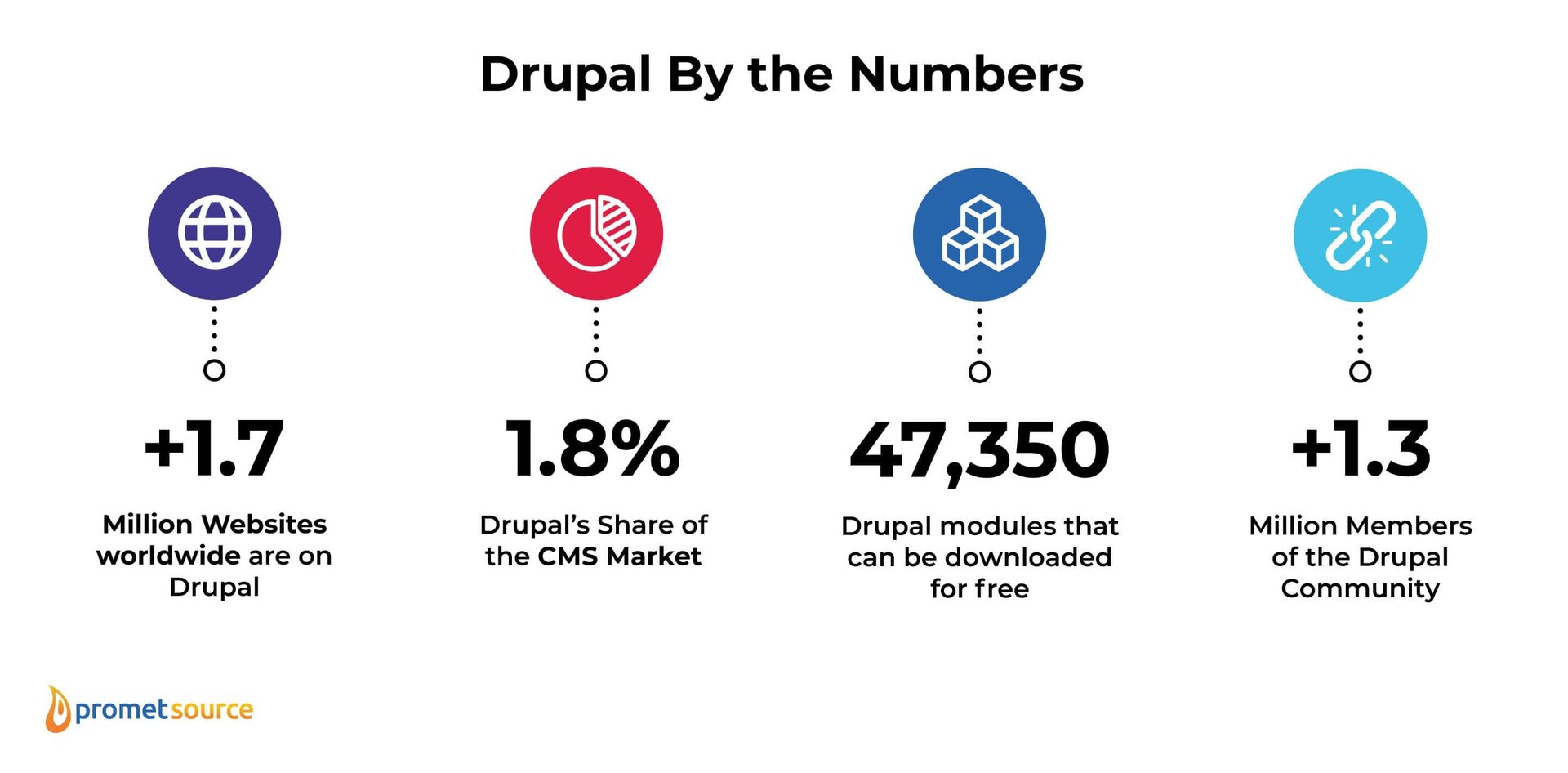 Sources: BuiltWith, W3Techs, WebTribunal
Sources: BuiltWith, W3Techs, WebTribunal
Drupal's Share of CMS Market
For reasons that include core support for multilingual sites, Drupal is an attractive CMS option for architecturally complex, high-stakes sites that can scale for surges in traffic such as:
- Government
- Higher education
- Large enterprises
- Health care institutions
Here are some examples of websites on Drupal:
- The City of London
- The State of New York
- Orange County, California
- The U.S. District Court of the Southern District of New York
- Southern Illinois University School of Medicine.
Another essential Drupal advantage: a diverse and dedicated community of contributors, as evidenced by 47,350 modules that are available for free download.
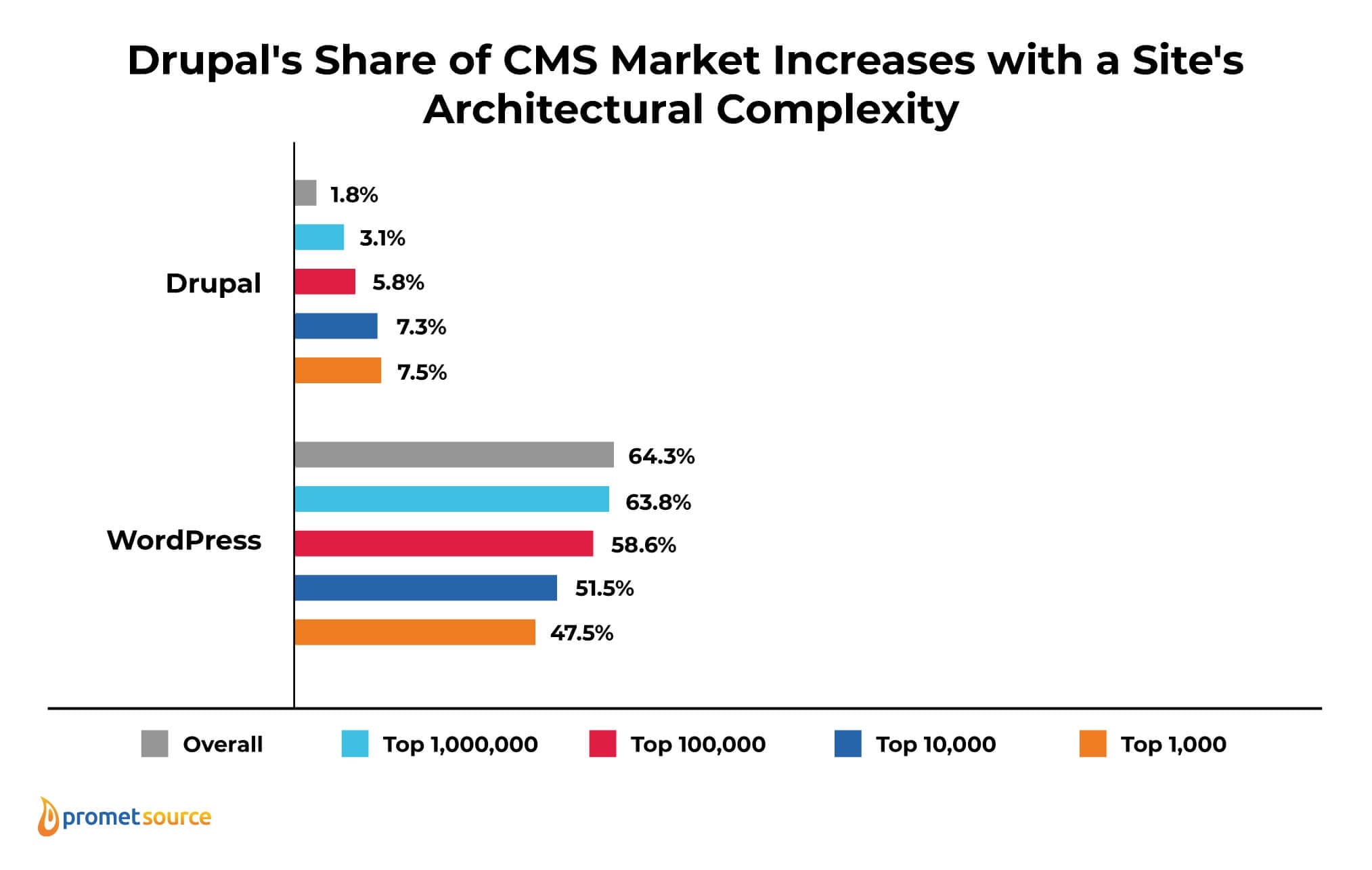
WordPress dominates the CMS market at every level.\ Drupal's share increases with a site's size and complexity -- from a 1.8% CMS market share overall, to a 7.5% share of the world's top 1,000 CMS sites. Source: W3Techs.com.
WordPress Advantages
While Drupal advantages come into play among architecturally complex sites, WordPress covers a wide spectrum of needs, and its popularity is on an upward trajectory, currently accounting for a 64.3% share of the worldwide CMS market.
Originally developed as a blogging platform, WordPress has maintained its appeal for non-tech types with the advantage of a relatively low barrier to entry.
It’s entirely possible to set up a WordPress site without development or coding expertise, experienced developers frequently work within WordPress and leverage their knowledge of HTML, CSS, and PHP to build sizable sites with a greater range of capabilities for both public and private sector clients.
Making steady inroads into the enterprise CMS space, WordPress is now the CMS of choice for an increasing number of heavy hitters such as:
WordPress offers more than 60,000 of plug-ins to expand functionality, outranking Drupal for ready-to-go themes that serve to fast-track site builds without the need for custom development work.
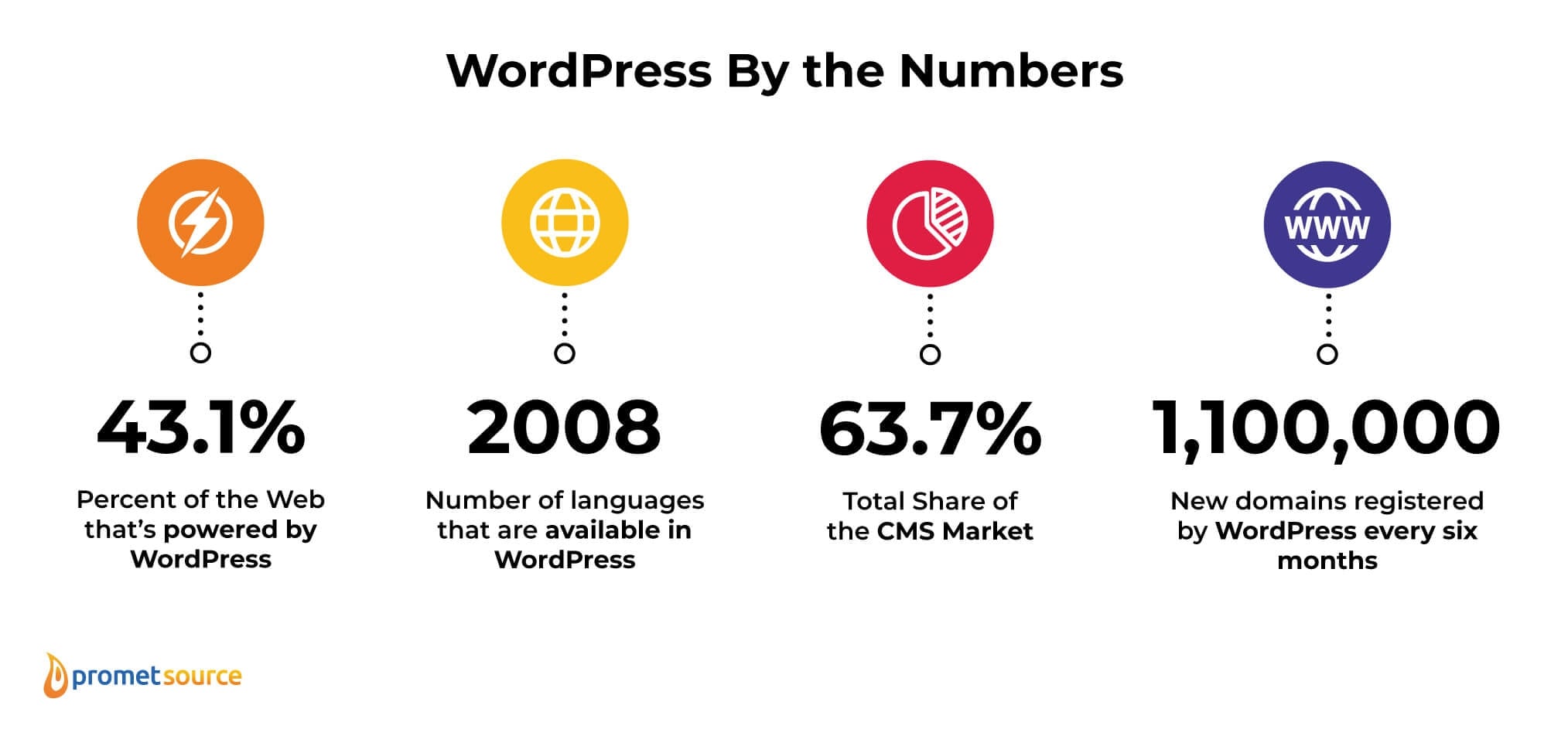
Source: 15 Fascinating Facts about WordPress
Among the conclusions to be drawn from WordPress’s impressive internet saturation: it’s a CMS that has proven to be the right fit for a wide range of different needs and has gotten many things right, from more than 60,000 plugins to an easy-to-use CMS.
Core Distinctions between Drupal vs WordPress
Both Drupal and WordPress offer a depth and breadth of add-ons that extend functionality. These are called "modules" in Drupal, and "plugins" in WordPress.
"Themes" that refer to a site’s aesthetics and user experience, such as design, layout, colors and navigation, is a term that applies to both Drupal and WordPress.
Here are some additional distinctions between WordPress and Drupal:
- Unlike Drupal’s 2015 architectural realignment with the launch of the enterprise-ready Drupal 8, WordPress has never undergone that same kind of overhaul. The resulting difference is that expanded functionality for WordPress occurs at the theme/plugin layer. Much of Drupal’s functionality, on the other hand, is centralized within the ever-increasing core level, as the most frequently used and widely accepted Drupal modules are continuously incorporated into core.
- Key Drupal modules that are used to build the majority of Drupal sites, such as Layout Builder, Translations, and URL aliases have been pulled into Drupal 10 core. The result is a greater efficiency associated with finding and installing contributed modules and streamlining development.
- Drupal core is becoming increasingly robust, while still allowing for the flexibility of whether or not to actually install core modules.
- WordPress functionality relies heavily upon themes and plugins, and this can be viewed as an advantage. The vast WordPress collection of themes and plugins provides a high degree of flexibility.
- The flipside of flexibility, on the other hand, and a key factor that tends to fuel the appeal of Drupal for architecturally complex enterprise, higher ed, and government sites, is that there is an inherently higher level of security and stability associated with core, vs the contributed module or plug-in layer.
- WordPress updates can be rolled out automatically without touching the code. This is a useful feature for smaller sites, but at Promet, we do not activate it because on a more complex site, something could break during the upgrade process that would require troubleshooting to unravel and fix. At this point, Drupal updates do not occur automatically, and require the intervention of a support partner or an in-house expert.
Scalability vs Complexity
While WordPress has proven itself to be extremely scalable and the right fit for a multitude of significant sites, the essential distinction which is often missed is not so much size and scalability, but complexity. Even though there are hundreds and hundreds of pages, on whitehouse.gov, for example, the site consists primarily of articles and information. When a greater range of content types and complex data models are required, Drupal proves to be the CMS of choice.
Acknowledging that both Drupal and WordPress are solid content management systems, and that there’s considerable overlap in the types of sites for which either would provide an excellent solution, Promet recently developed the following matrix in an effort to highlight the relative strengths of both options and open a dialog among our teams.
Here’s what we came up with relative to 10 key criteria.
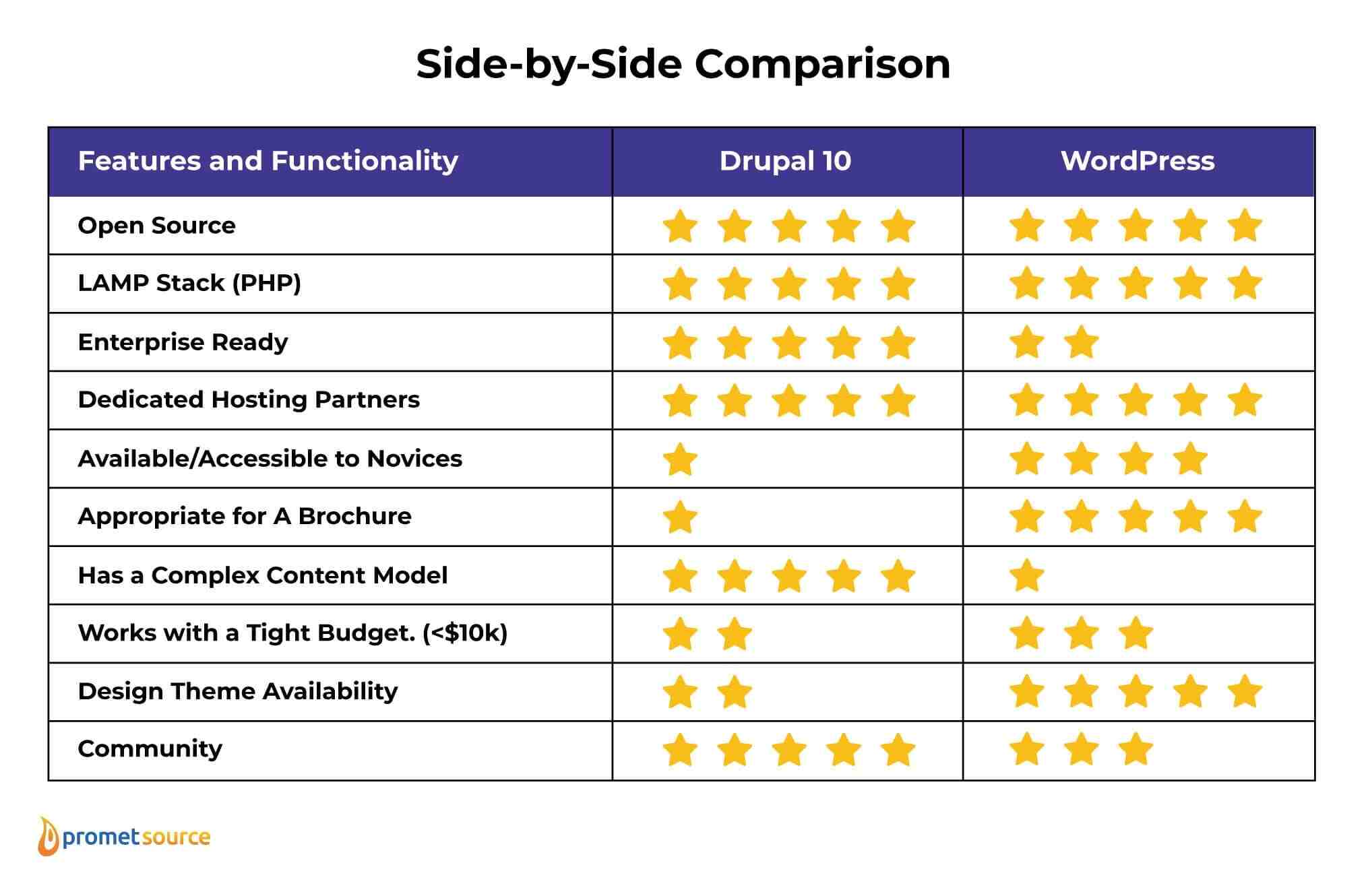
- Open Source. Both Drupal and WordPress are solid open-source solutions with great track records.
- Lamp Stack (PHP). Both use Lamp Stack PHP equally. Five stars for both.
- Enterprise Ready. That’s where Drupal shines. WordPress: Yes and No. It’s applicable for some, not all, enterprise applications.
- Dedicated Hosting Partners. Both Drupal and WordPress have dedicated hosting partners, allowing for proactive maintenance, as well as heightened security, speed, and reliability.
- Available/Accessible to Novices. With the availability of Layout Builder in Drupal core, barriers to entry have been reduced. Even though developing a Drupal site and understanding how to work within the Drupal interface requires distinct expertise and training, it is now easier to create a Drupal site than it was in Drupal 7 or even 8. Barriers to entry are inherently lower in WordPress. A non-technical hobbyist or small business owner with a touch of know-how can find a theme that fits their needs and figure out how to build and manage a WordPress site, but developing a complex or enterprise-level WordPress site requires development expertise.
- Appropriate for a Brochure Site. Even though Drupal sites offer core and contributed modules that enable component building capabilities similar to Elementor in WordPress, there is often not much point in relying on Drupal for a brochure site when other, more appropriate options are available. WordPress was originally developed for blog and brochure sites, and it is ideal for that purpose. This is true for reasons that include it is simply easier to get started in WordPress and the vast number of WordPress themes can eliminate the need for customization.
- Complex Content Model. Complex taxonomy content models are where Drupal thrives. Not so much for WordPress, which best serves sites that don’t require the organization of high levels of complexity.
- Works for a Tight Budget (Under $10,000). The flipside of Drupal’s ability to navigate complexity tends to be the requirement of considerable developer legwork and ramping up. WordPress offers a greater range of out-of-the box solutions and, depending on requirements, it’s quite possible to build a respectable Drupal site for under $10,000.
- Design Theme Availability. Drupal has a limited number of design themes that are ready out of the box. While Promet has created a Drupal theme within the Provus® component-based design system, WordPress has an extensive and robust selection of design themes.
- Community. Drupal is powered by a professional community of dedicated developers, who regularly gather for training and information exchange at events, camps, and meetups all over the world. While there are many professional WordPress events, the WordPress community is more diverse and less cohesive.
Tracking the Evolution
Among those of us whose history in the CMS trenches dates back many years, it’s been very interesting to witness the evolutions of both Drupal and WordPress.
Selecting the right CMS calls for careful consideration and expert analysis. The Drupal vs WordPress conversation does not lend itself toward across-the-board rules or easy answers. In fact, the judgment and expertise of anyone who suggests that Drupal is always the answer or that WordPress is always the answer should be considered highly suspect.
As the saying goes: “When all you have is a hammer, everything looks like a nail.”
WordPress and Drupal each have a distinct place at their respective ends of the CMS spectrum, with hobbyist or small business sites on one end and complex, government and enterprise-level digital experiences at the other. The vast middle ground between these two ends can be highly nuanced with no easy answers, but there’s a likelihood that either Drupal or WordPress would work equally well.
The main thing is the assurance that true experts with a depth of perspective and commitment to client success are doing the work.
Interested in an expert analysis of the CMS that stands to represent the right fit for your organization’s distinct objectives? At Promet Source, we have the right people to help with that. Let's talk!
Other Insights & Resources you may like
Get our newsletter
Get weekly Drupal and AI technology advancement news, pro tips, ideas, insights, and more.





